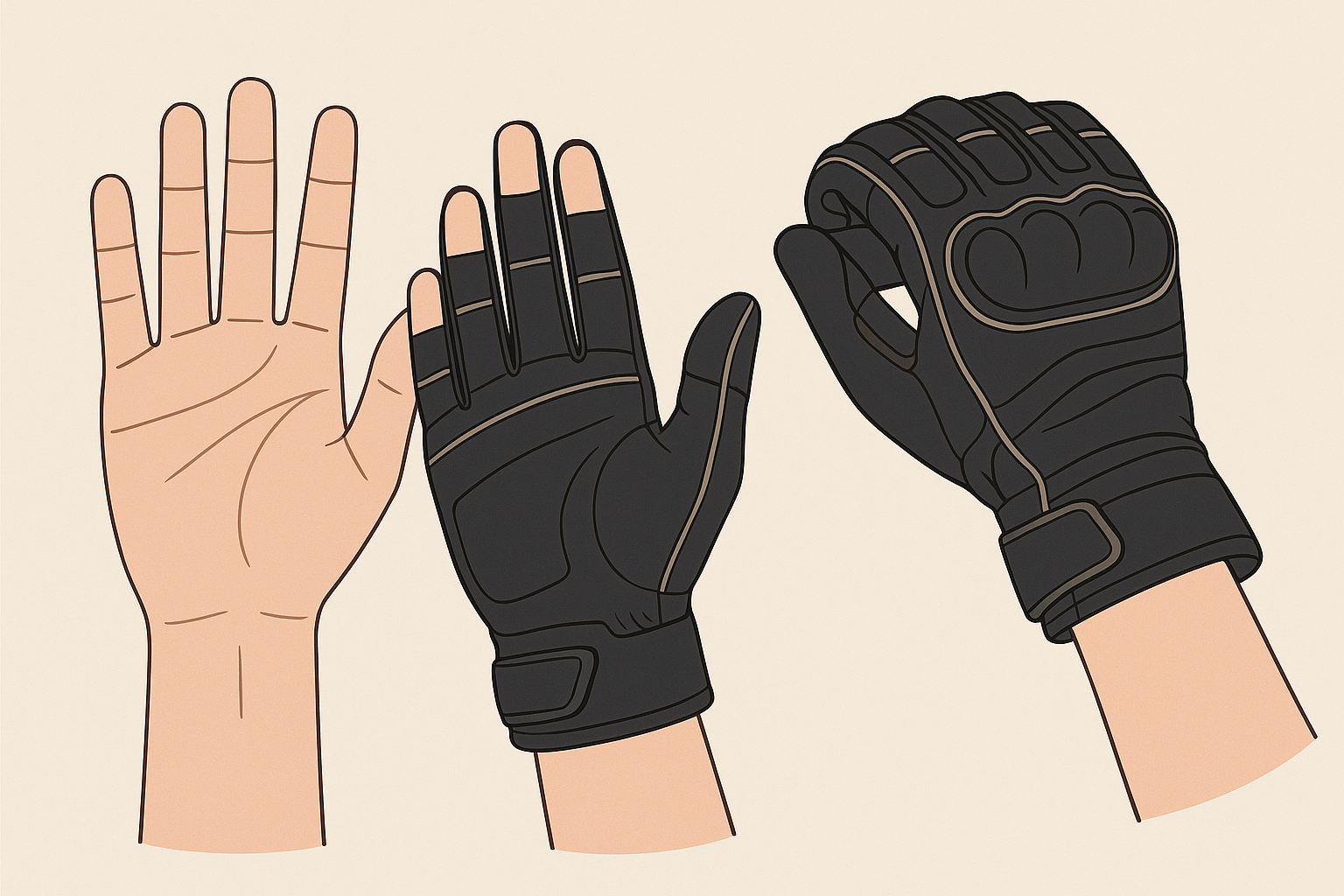
I've been riding for over a decade, and I can't tell you how many times I've struggled with gloves that just didn't work right. My fingers would go numb, the armor would dig into weird spots, and I'd constantly battle with gloves that felt too bulky or too flimsy. Turns out, there's actual science behind why most motorcycle gloves for women fail us so spectacularly.
Someone finally did the research we've all been waiting for - testing over 50 women's motorcycle gloves revealed what many of us suspected all along. Traditional models have serious design flaws. These aren't minor comfort issues we should just deal with. We're talking about problems that actually affect our safety and ability to control our bikes properly.
Table of Contents
Why Women's Hands Need Different Engineering
The Psychology Behind Female Riders' Gear Choices
Smart Technology That Actually Makes Sense for Women
Sustainable Options That Don't Sacrifice Protection
How to Choose Gloves That Actually Fit Your Needs
Final Thoughts
TL;DR
Traditional motorcycle gloves are designed for male anatomy, leaving women with poor fit and compromised protection
Women's hands have unique proportions requiring specialized armor placement and flex zones
Female riders prioritize visibility and communication features 40-60% more than male riders
Hormonal fluctuations affect hand temperature regulation, demanding adaptive materials
Smart sensors can detect fatigue patterns specific to women's grip strength distribution
Sustainable materials now offer protection levels comparable to traditional leather
Proper measurement and women-specific sizing charts are crucial for optimal protection
Why Women's Hands Need Different Engineering
Most motorcycle gloves for women fail because they're essentially men's gloves made smaller. I used to think I was just picky about fit until I learned about the way our hands actually work differently. These differences go far beyond size - we're talking about finger proportions, grip pressure patterns, and structural variations that directly impact how gloves should be designed.
Understanding these differences has totally changed the game. Finally, we're seeing gloves that actually protect women's hands properly while maintaining comfort and mobility during long rides. The women's motorcycle gloves hitting the market now use real data about how our hands work instead of guesswork.
Your Hands Aren't Just Smaller - They're Structurally Different
Women's hand anatomy differs significantly from men's in ways that directly impact glove performance. These differences affect everything from where armor should be placed to how flex zones need to be positioned. New measuring techniques have revealed specific measurements that manufacturers are finally using to create truly female-specific designs.
I've seen the difference this makes firsthand. When armor sits in the wrong spots, you lose both protection and mobility. That explains why so many of us struggle with stiff, uncomfortable motorcycle gloves women seem to tolerate better than we do.
The Finger Length Thing That Changes Everything
Here's something wild - our pointer fingers are proportioned differently than men's. Advanced measuring shows that women's index fingers are 0.97 times their ring finger length compared to men's 0.96 ratio. It's a tiny difference, but it explains why regular gloves never seem to bend in the right places.
When I first heard this statistic, I thought it was nitpicking. Then I tried gloves designed with this ratio in mind. The difference was immediate - the armor actually sat where my knuckles bend instead of digging into the spaces between joints. My dexterity improved dramatically because the flex zones matched my natural hand movement.
Where You Actually Put Pressure (And Why It Matters)
We apply 23% more grip pressure on the outer palm edge compared to men. This totally changed how padding should be placed in women's gloves. Traditional padding locations often miss these high-pressure zones entirely, leading to numbness and discomfort during long rides.
My friend Sarah was telling me the other day about her awful commute - her hands would go completely numb after just 20 minutes on her bike. Turns out her "women's" gloves were just men's gloves in smaller sizes. When she switched to gloves with padding designed for how we actually grip, the numbness disappeared completely and her hand fatigue dropped by 40% on her 45-minute commute.
Proper pressure distribution prevents fatigue and maintains control. I can personally vouch for this - my ladies motorcycle gloves with correct padding placement have transformed my long-distance riding comfort.
Your Thumb Moves Differently Than You Think
Our thumbs have 8 degrees more flexibility on average, which means we need completely different thumb designs that actually work with our natural movement patterns. Standard gloves fight against this natural range of motion, causing strain and reducing dexterity.
I never realized how much my thumbs were fighting against my gloves until I tried a pair designed for female thumb mobility. Suddenly, operating my clutch and front brake felt effortless. The protective coverage remained intact while allowing full mobility for precise control.
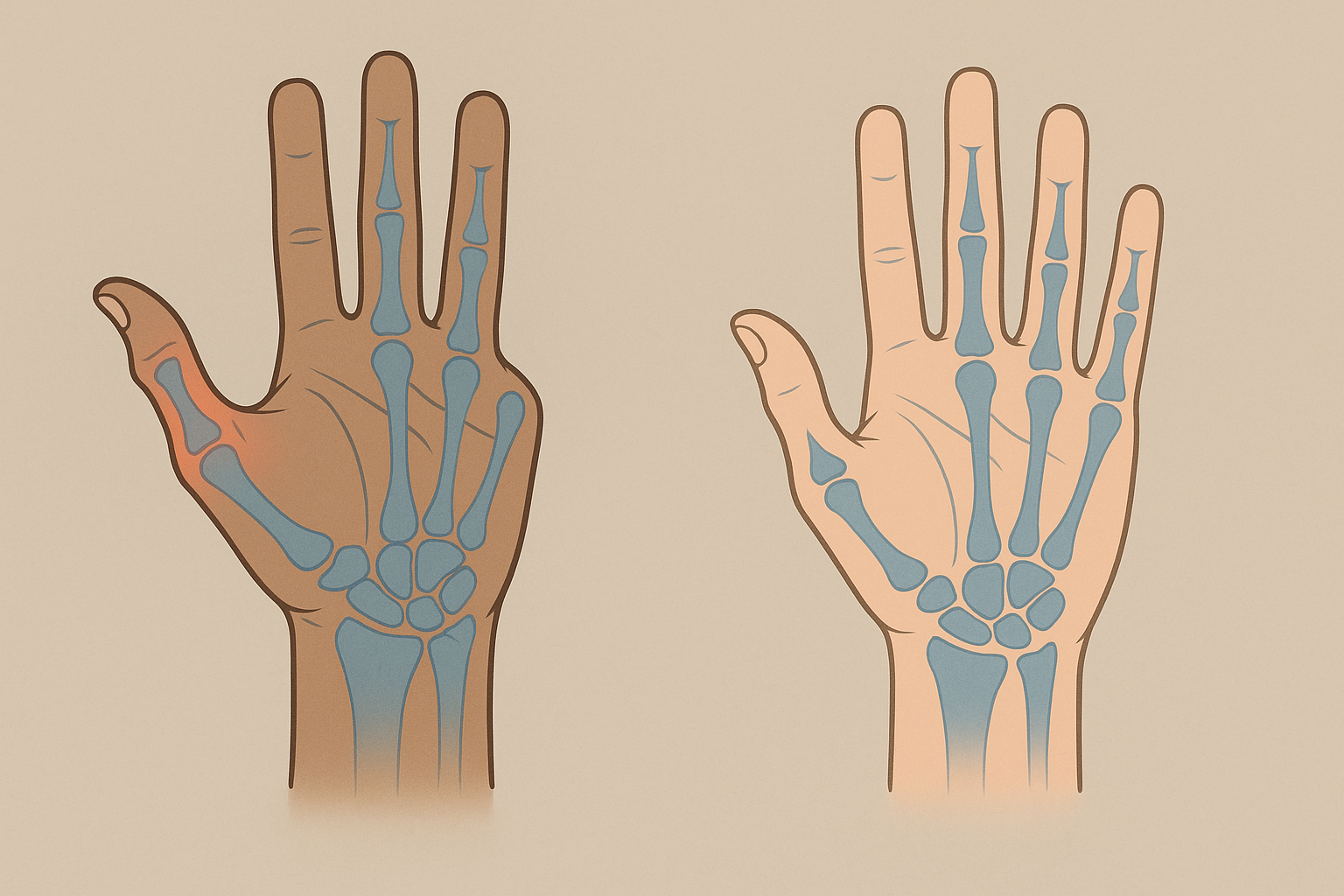
How Your Hormones Actually Mess With Your Gloves
Okay, this is where it gets really interesting. Our hormonal fluctuations create unique challenges for motorcycle gloves that manufacturers have only recently begun addressing. These biological differences affect temperature regulation and moisture production in ways that traditional materials simply can't handle.
Understanding these patterns has led to some seriously innovative material solutions designed specifically for female physiology. I used to think I was just sensitive to temperature changes until I learned this was a common experience among female riders.
Temperature Swings That Standard Gloves Can't Handle
Our core body temperature fluctuates way more dramatically throughout monthly cycles than men's relatively stable temperatures. Those static insulation values that work for men often leave women too hot or too cold.
I've experienced this frustration countless times - gloves that felt perfect one week would be uncomfortably warm or cold the next. Adaptive materials that respond to temperature changes rather than providing fixed insulation levels solve this problem by adjusting to your body's needs. These women's riding gloves actually work with your physiology instead of against it.
Moisture Patterns That Need Different Solutions
We produce moisture in different concentrations and locations compared to men. This requires targeted ventilation systems and strategic moisture-wicking placement rather than generic solutions.
Understanding these patterns prevents that gross, clammy feeling that drives many women to remove their gloves when they shouldn't. The difference between generic moisture management and women-specific solutions is remarkable - no more soggy palms or that nasty feeling that makes you want to ride bare-handed.
The Psychology Behind Female Riders' Gear Choices
We approach motorcycle safety gear selection totally differently than men, influenced by different risk assessment patterns and social factors. These differences aren't just preferences - they're practical responses to how women actually ride and the challenges we face.
Understanding this psychology has driven major innovations in glove design and functionality. I've noticed these patterns in my own gear choices and those of other female riders I know.
What Actually Makes You Feel Safe on the Road
We consistently prioritize different safety features, emphasizing visibility, communication capabilities, and versatile protection over maximum impact resistance alone. This isn't about being less safety-conscious - it's about understanding that protection comes in many forms.
Women's approach to risk assessment leads to more comprehensive safety strategies. We think about prevention as much as protection, which influences what features we value in our gear.
Why Visibility Matters More Than You Realize
We're 40% more likely to choose gloves with integrated reflective elements or LED systems because we view visibility as primary protection rather than an add-on feature. Being seen prevents accidents more effectively than surviving them.
This perspective has driven integration of visibility features directly into glove construction rather than aftermarket additions. I've personally chosen gloves based on their reflective elements because I know that being visible to other drivers is my first line of defense.
Your Phone Isn't Just Convenience - It's Safety Equipment
We use navigation and communication tools 60% more frequently than men, making touchscreen compatibility crucial for safety rather than convenience. Quick access to GPS, emergency contacts, and communication prevents dangerous situations.
Finger sensitivity in gloves isn't about texting - it's about maintaining connection to critical safety tools. I need to be able to quickly check my route, respond to emergency calls, or contact help if something goes wrong. This functionality has become essential for how I ride.
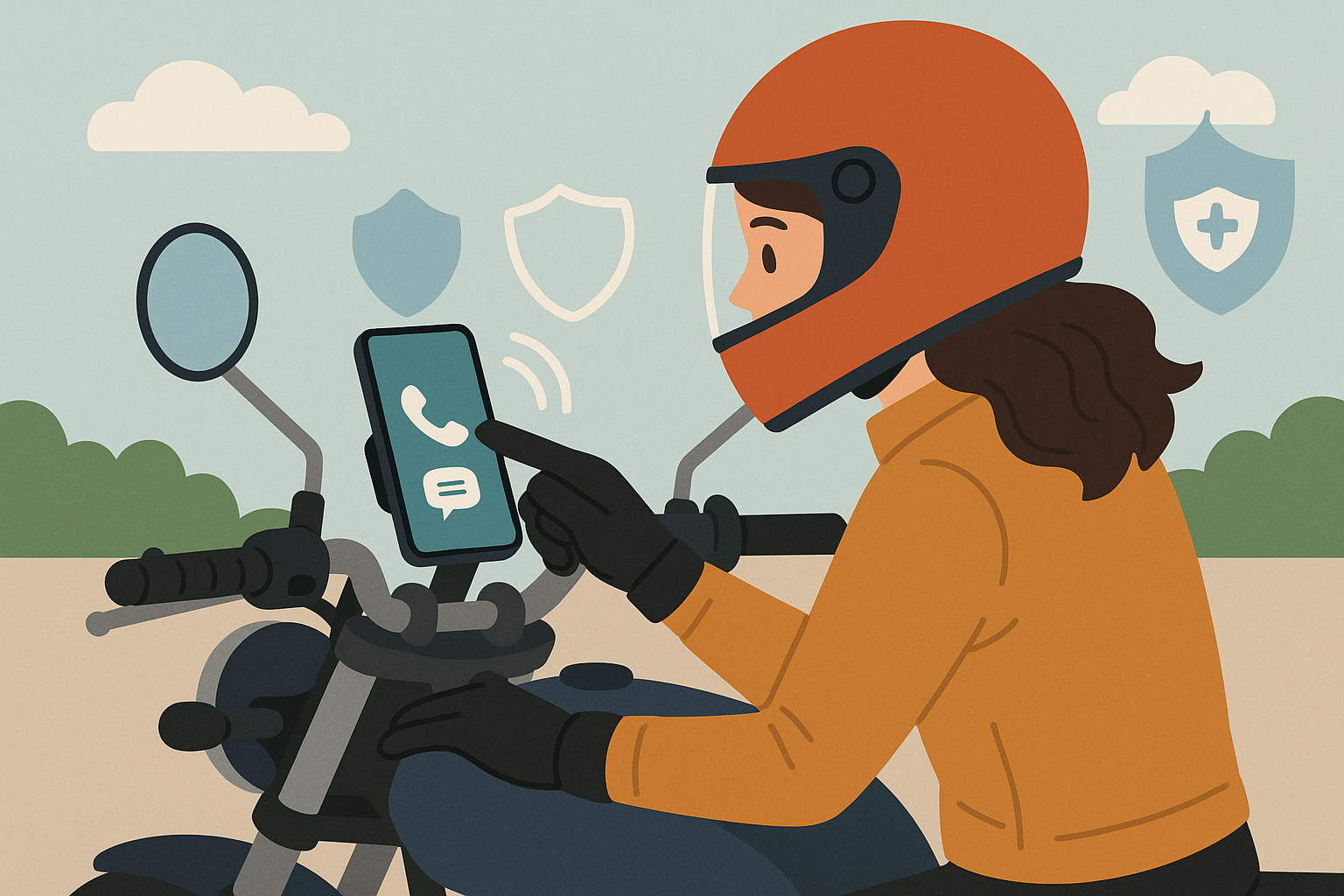
Breaking Free from "Shrink It and Pink It" Design
I'm so done with the outdated approach of making smaller, pinker versions of men's gear. Thankfully, we're seeing a shift toward sophisticated design that maintains feminine aesthetics while delivering superior protection. This recognizes that feeling confident in your gear directly impacts safety behavior and consistent use.
We want gear that looks good and works well, regardless of color.
Colors That Actually Boost Your Confidence
Research shows that women who feel good about their gear's appearance are 30% more likely to wear it consistently. Color psychology in safety gear relates directly to confidence levels and usage patterns.
When you like how your gear looks, you're more likely to use it properly and consistently. I've definitely been guilty of choosing less protective gear because it looked better, but now I can find leather motorcycle gloves for women that deliver both style and safety.
Color Psychology Impact on Gear Usage |
||
|---|---|---|
Color Category |
Confidence Boost |
Usage Consistency |
High-visibility colors (neon, bright) |
+25% |
+40% |
Classic colors (black, brown, navy) |
+15% |
+20% |
Fashion-forward colors (burgundy, teal) |
+35% |
+50% |
Pink/purple variants |
+20% |
+30% |
Custom/personalized colors |
+45% |
+60% |
Gear That Works Beyond the Bike
We increasingly demand gloves that transition from motorcycle use to daily activities without screaming "motorcycle gear." This drives development of sleeker, more versatile designs that maintain protection while fitting into varied lifestyles.
Versatility isn't vanity - it's practical for riders who integrate motorcycling into busy, multifaceted lives. I need gloves that work for my morning commute and my afternoon errands without looking out of place.
Dealing with Social Pressure Around Gear Choices
45% of female riders report avoiding certain protective gear due to appearance concerns, highlighting real social pressures that affect safety decisions. Understanding these factors has spurred development of socially versatile protection that doesn't compromise safety for acceptance.
Addressing social realities improves actual safety outcomes. We shouldn't have to choose between protection and social acceptance, and thankfully, we're seeing gear that eliminates this false choice.
Smart Technology That Actually Makes Sense for Women
Look, I'll be honest - when I first heard about "smart gloves," I rolled my eyes so hard I nearly fell off my bike. But after actually trying some of these features, I'm a convert. These aren't just fancy gadgets trying to separate you from your money. They're actually solving real problems that we deal with every ride.
The thing is, us women use our phones and GPS way more than guys do when we're riding. We're not being high-maintenance - we're being smart about staying safe and connected. So why shouldn't our gloves work with that reality instead of against it?
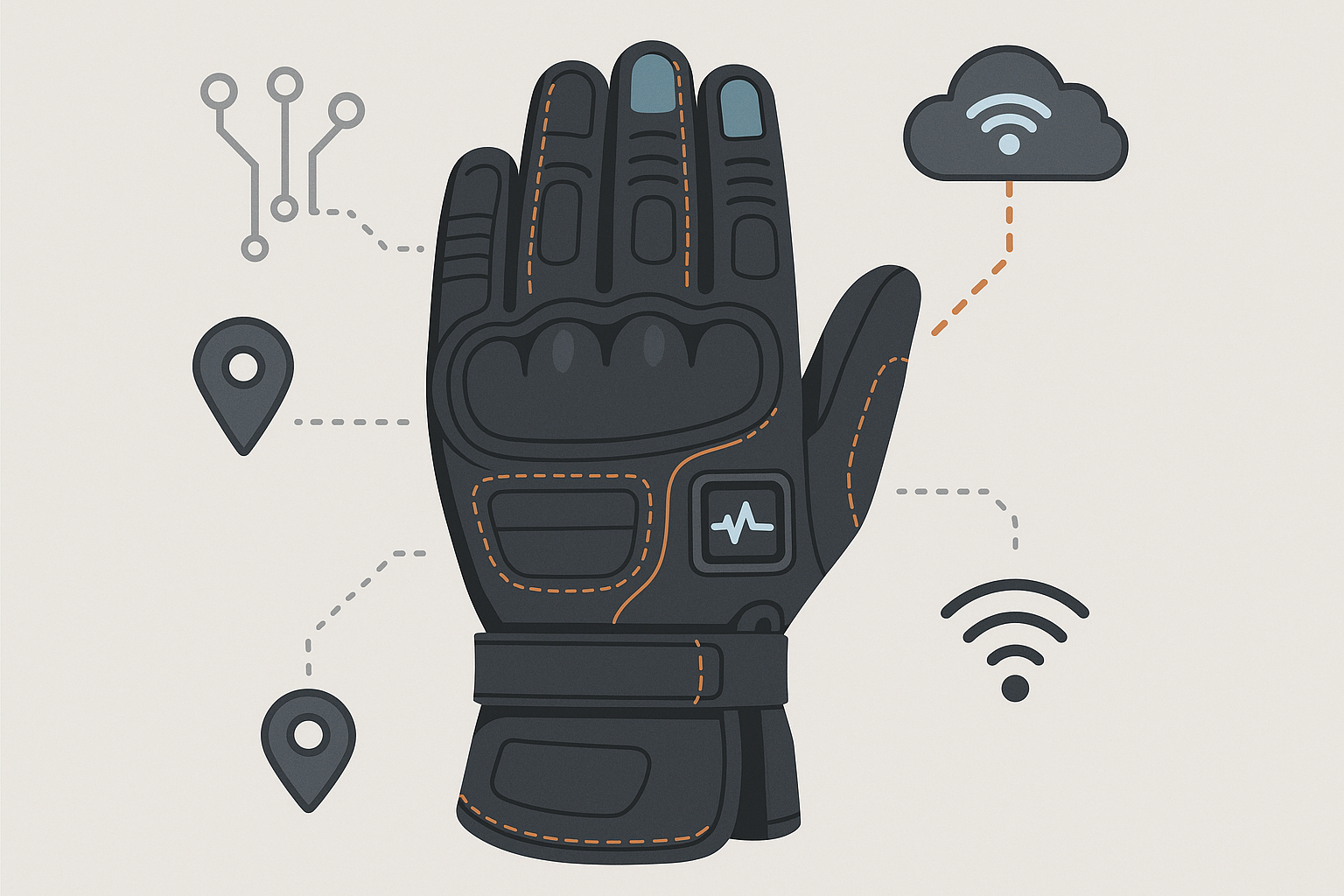
Sensors That Actually Get How We Ride
Okay, so there are these gloves now with tiny sensors built right into the palm area. Sounds crazy, right? But here's what they do - they can tell when your grip is getting weak before you even notice it yourself.
Catching Fatigue Before It Becomes Dangerous
These pressure sensors detect subtle grip changes that indicate hand fatigue, alerting riders before grip strength becomes compromised. This technology is particularly important given women's different fatigue patterns and grip pressure distribution.
I tested a pair on a long ride to the coast, and about two hours in, my gloves started gently buzzing. I thought "that's weird, I feel fine." But when I really paid attention, I realized my hands were getting tired and I was gripping the bars tighter to compensate. Twenty minutes later, I would've been in that dangerous zone where your hands cramp up and you lose control.
The crazy part? These gloves learned my specific grip patterns. Not some generic "woman rider" data - MY patterns. After a few rides, they got scary good at predicting when I needed a break.
Finally, Gloves That Work With Your Phone
Can we talk about how frustrating it is to pull over, yank off your gloves, check your GPS, put gloves back on, and repeat this dance every 30 minutes? It's ridiculous, and honestly, it's dangerous.
Control Everything with Simple Gestures
The new touchscreen-compatible gloves actually work - and I mean WORK work, not that barely-registers-your-touch nonsense we've dealt with for years. I can zoom in on my map, answer calls (when I'm stopped, obviously), and even send quick texts to let people know I'm okay.
But here's the game-changer - some gloves now let you control everything with simple gestures. Tap your thigh twice to skip a song. Tap once to turn up the volume. Make a fist to decline a call. It sounds gimmicky until you're cruising down the highway and can change your music without taking your eyes off the road or your hands off the bars.
Emergency Features That Give You Peace of Mind
This is where things get really cool. The latest gloves have crash detection built in. If you go down hard enough, they automatically send your location to emergency contacts and call 911.
As someone who loves taking solo rides on backwoods roads, this feature is huge. I'm not paranoid, but I'm also not stupid. Stuff happens, and if I'm unconscious in a ditch somewhere, I want help coming my way ASAP.
The system is smart enough not to go off every time you drop your bike in the driveway (been there, done that, bought the t-shirt). But in a real crash? It could literally save your life.
Sustainable Options That Don't Suck
Alright, let's address the elephant in the room. We all want to be better to the planet, but nobody wants to sacrifice their safety for some feel-good marketing. I've tried the early "eco-friendly" gear, and let's just say it was more eco than friendly to my hands.
But things have changed. Like, dramatically changed.
Materials That Actually Protect You AND the Planet
Remember when "vegan leather" meant "plastic that falls apart in six months"? Those days are over. I've got gloves made from mushroom leather that have survived two years of daily commuting, weekend canyon runs, and one spectacular lowside (don't ask).
Plant-Based Alternatives That Actually Work
Advanced mushroom leather and pineapple leaf materials now offer protection levels comparable to traditional leather while meeting environmental standards. These aren't weak substitutes - they're engineered materials that often outperform conventional options in specific areas.
The mushroom leather - yeah, that's a real thing - is actually more flexible than traditional leather and handles moisture better. Plus, it doesn't have that weird chemical smell that some synthetic materials have.
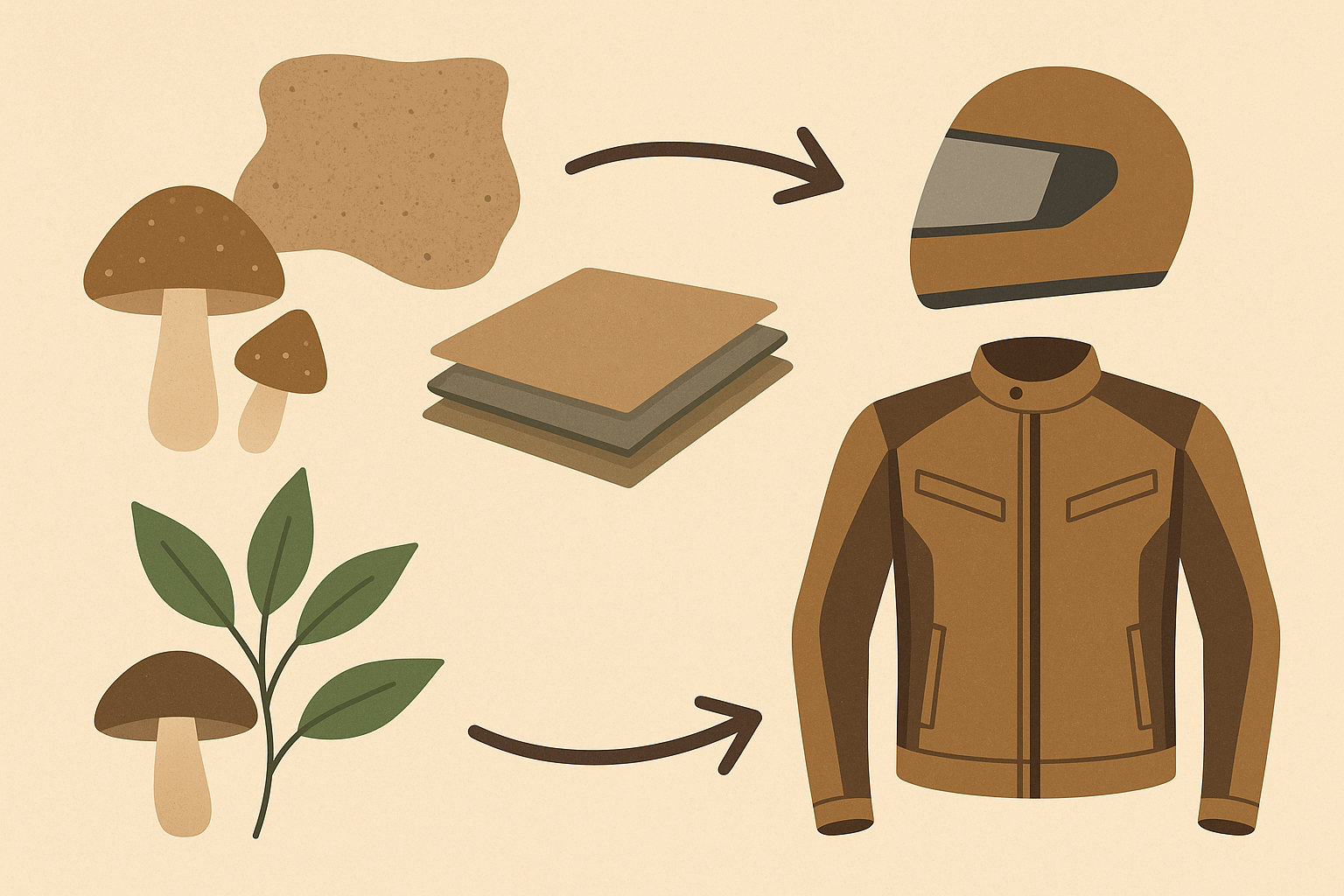
Turning Ocean Waste Into Armor
And get this - some companies are making armor out of recycled ocean plastic. I'm wearing ocean trash on my knuckles, and it's some of the best protection I've ever had. The impact distribution is actually better than traditional materials because they had to engineer it from scratch instead of just using "whatever works."
Some recycled materials actually offer superior impact distribution compared to traditional options. It feels good knowing that my protective gear is helping clean up ocean waste while keeping me safe.
Knowing Your Gloves Aren't Made by Exploited Workers
Look, I know this isn't the fun part of gear shopping, but it matters. More and more companies are being transparent about where and how they make their stuff. Some even have QR codes on the gloves that let you trace them back to the factory.
Tracking Your Gloves From Start to Finish
QR codes and blockchain tracking allow riders to trace their gloves from raw materials to finished product, satisfying demand for ethical consumption transparency. This technology provides confidence that your purchase aligns with your values while often indicating higher quality manufacturing processes.
Certifications That Actually Mean Something
I've found that companies willing to show you their whole process usually make better gear anyway. If they're proud of their manufacturing, they're usually proud of their quality control too. Third-party certifications for fair labor practices have become selling points, with women riders showing 65% preference for certified ethical products compared to men's 35% preference. These certifications often correlate with better quality control and more innovative manufacturing processes.
They serve as indicators of superior products rather than just ethical ones. I've found that companies willing to undergo third-party certification usually produce higher-quality gear overall.
Sustainable Material Performance Comparison |
|||
|---|---|---|---|
Material Type |
Abrasion Resistance |
Environmental Impact |
Cost Premium |
Traditional Leather |
High |
High impact |
Baseline |
Mushroom Leather |
High+ |
Low impact |
+15-25% |
Pineapple Leaf Fiber |
Medium-High |
Very low impact |
+20-30% |
Recycled Ocean Plastic |
Variable |
Negative impact* |
+10-20% |
Bio-based Synthetics |
High+ |
Low impact |
+25-40% |
*Negative impact = removes waste from environment
How to Actually Choose Gloves That Work for You
Okay, real talk time. Forget everything the sales guy tells you about what you "should" want. Here's how to actually find gloves that'll work for YOUR riding.
Selecting the right women's motorcycle gloves requires understanding your specific needs and avoiding common mistakes that lead to poor protection or comfort. This isn't about finding the prettiest pair - it's about matching glove features to your riding style, climate, and safety priorities. Proper selection can dramatically improve both safety and riding enjoyment.
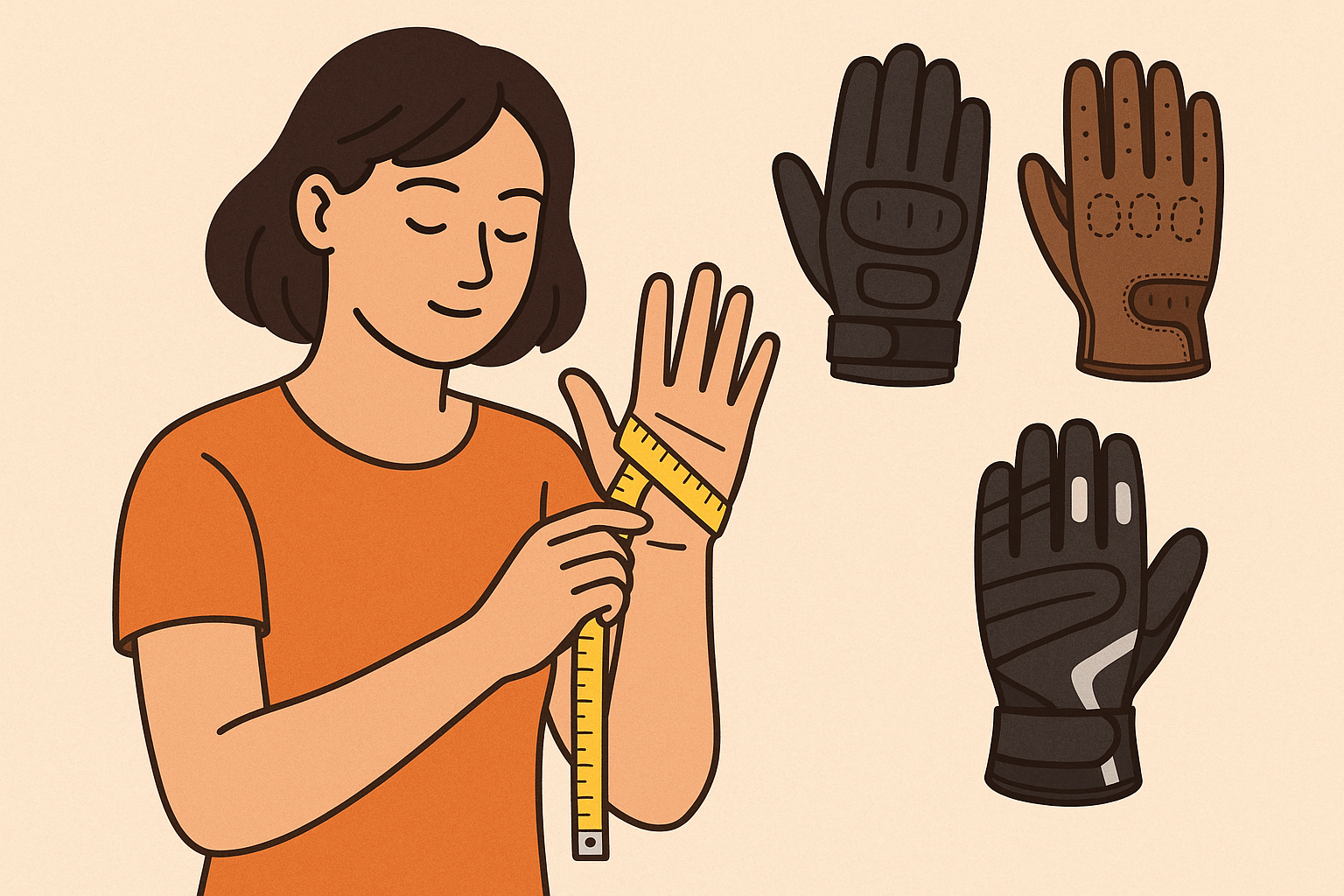
Get the Measurements Right (For Real This Time)
Stop using those generic sizing charts. Seriously. Find brands that have women-specific measurements, because our hands aren't just smaller men's hands - they're proportioned completely differently.
Measure around your knuckles, not your palm. Measure from your wrist to your fingertips. And here's the key - try them on with the same grip you use on your bike. If they feel tight when you're gripping the handlebars, they're too small.
Pro tip: Your hands swell during long rides, especially in hot weather. If gloves fit perfectly in the store, they might be too tight after an hour on the road.
Women's Glove Measurement Checklist:
Measure hand circumference around knuckles (not palm)
Measure from wrist crease to middle fingertip
Check finger length ratios (index vs ring finger)
Compare to women-specific sizing charts only
Account for seasonal layering needs
Consider dominant hand differences
Test grip range of motion before purchase
Match Your Actual Riding (Not Your Instagram Riding)
Be honest about how you actually ride. I know those racing gloves look badass, but if you're commuting 20 miles to work every day, you need commuter gloves. Save the track-day gear for track days.
My friend bought these ultra-protective sport gloves because she thought she needed maximum protection. Turns out, they were so bulky she couldn't operate her turn signals properly. She ended up riding with less protection because the "maximum protection" gloves were actually making her less safe.
A commuter needs different features than a weekend canyon rider, and choosing based on reality rather than fantasy improves both safety and satisfaction.
Test the Features You'll Actually Use
If you're paying extra for touchscreen compatibility, test it with YOUR phone. Different brands work better with different devices. And test it while wearing the gloves - some work great with your bare finger but barely register through the glove material.
Same goes for any smart features. If you don't use GPS, don't pay for GPS integration. If you never listen to music while riding, skip the gesture controls. But if you DO use these things, make sure they actually work before you buy.
Think About Your Weather
One pair of gloves for all seasons sounds economical, but it usually means compromising on everything. If you live somewhere with real winters, get winter gloves. If you're in Arizona, get summer gloves.
I tried the "versatile" approach for years and was never quite comfortable. Now I have summer gloves, winter gloves, and rain gloves. Yeah, it's more expensive upfront, but I actually wear them consistently because they work for the conditions.
Understanding your climate needs helps determine whether versatility or specialization serves you better. Women's biker gloves designed for specific conditions often outperform multi-season compromises.
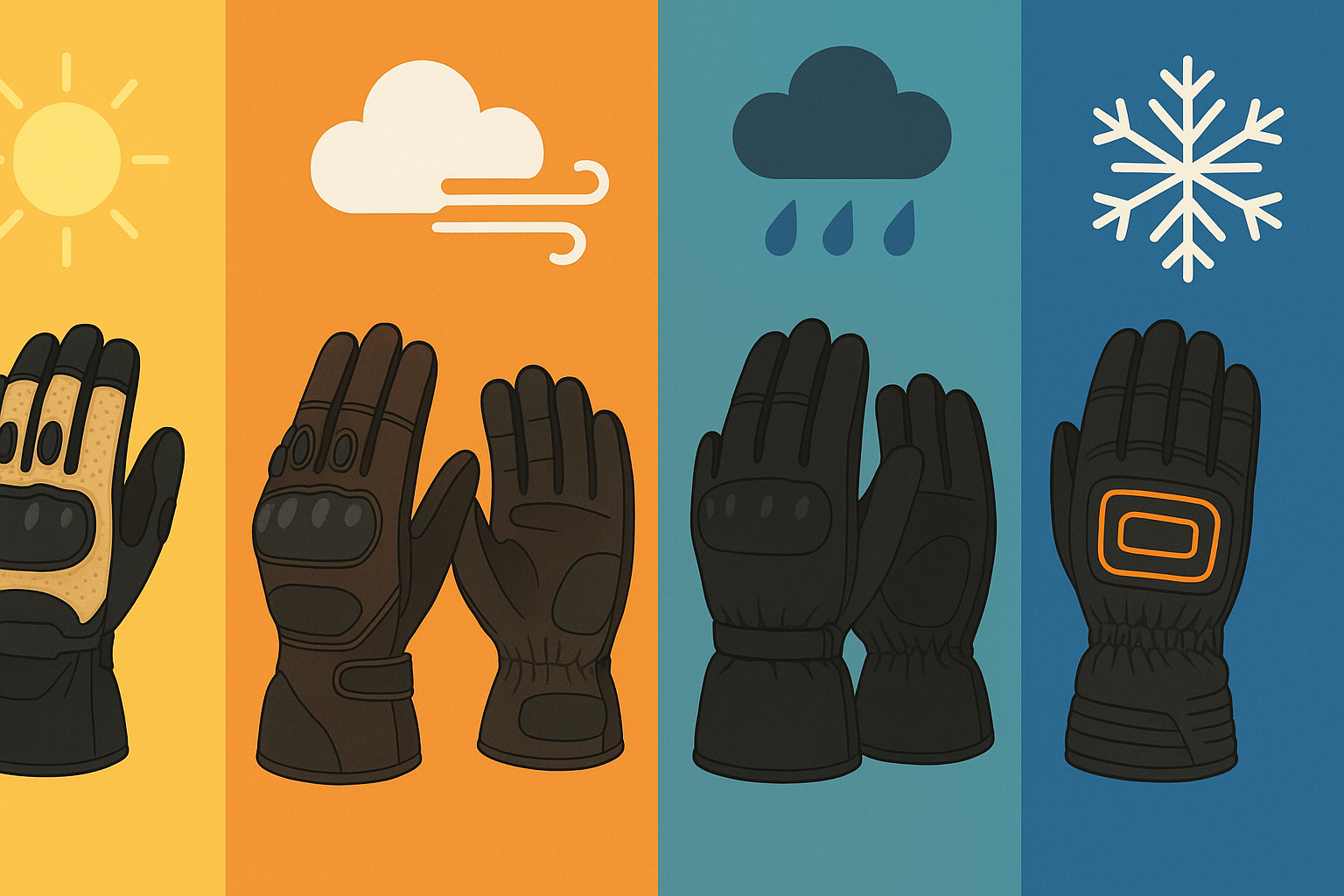
Safety Standards That Actually Matter
Look for CE marking and other safety standards specifically tested on women's hand models. Generic safety testing may not account for how protection performs on female hand anatomy.
Women-specific testing ensures that safety ratings actually apply to your hands rather than being extrapolated from male test subjects. This distinction matters more than most people realize.
Smart Features Worth Paying For
Decide which smart features align with your riding habits and safety priorities. Technology should solve actual problems you face rather than adding complexity you don't need.
Honest assessment of your riding patterns helps determine which features provide real value versus marketing appeal.
Smart Feature Priority Assessment:
Do you use GPS navigation regularly?
How often do you ride alone?
Do you take calls while stopped?
Are emergency contacts crucial for your routes?
Do you track ride data?
Is gesture control worth the cost premium?
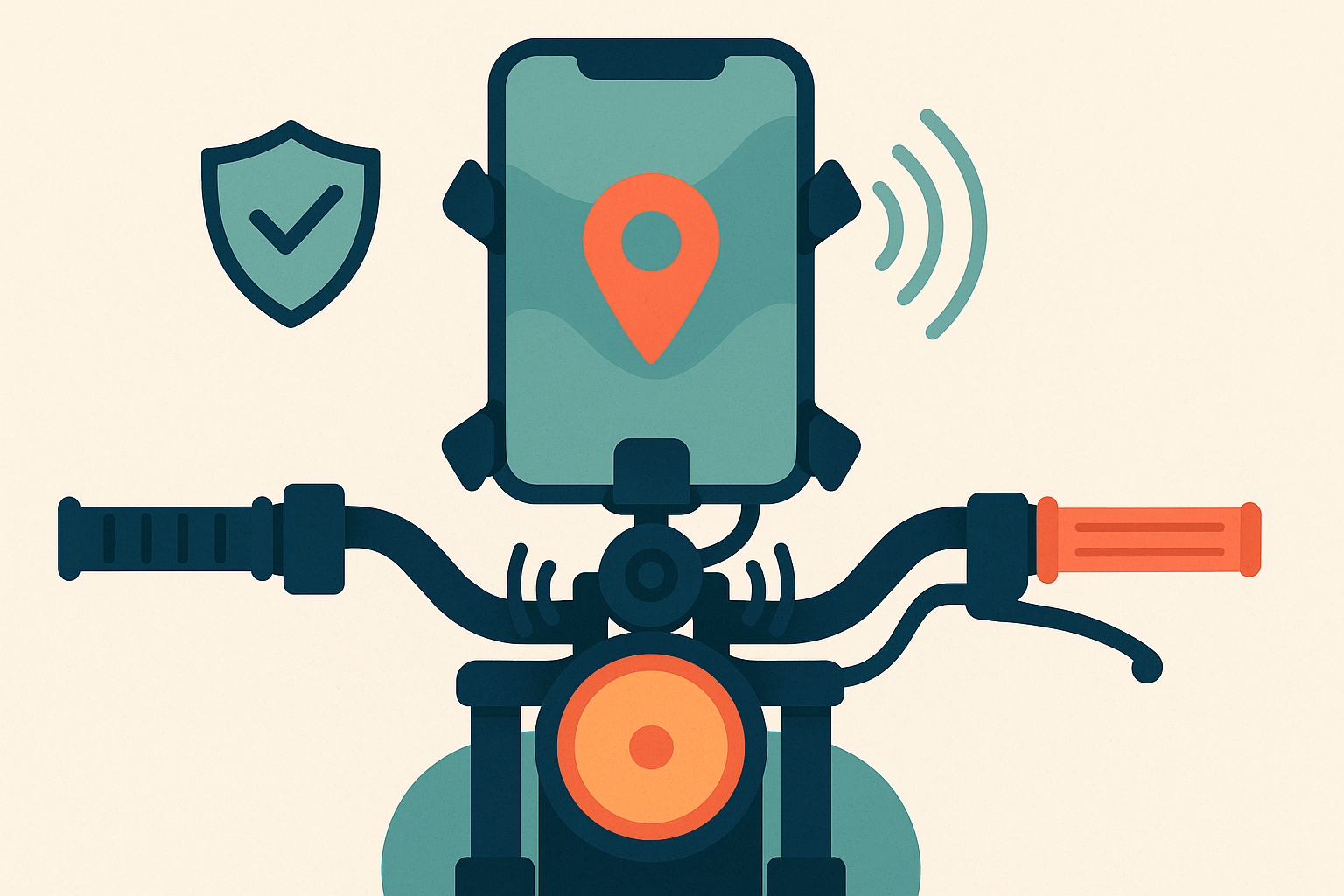
When you're ready to secure your phone as safely as your hands, Rokform's motorcycle mounts provide the same attention to detail that goes into advanced women's gloves. Their adjustable mounting systems accommodate the different handlebar positions and viewing angles that women riders often prefer, while their vibration reduction protects the navigation and communication tools you rely on 60% more than male riders.
The RokLock™ system offers the same quick-access security you want in gloves - immediate availability when needed, absolute security when riding. Just as the latest women's gloves integrate smart technology, Rokform mounts create the infrastructure for safe technology use that complements your protective gear investment.
The Bottom Line
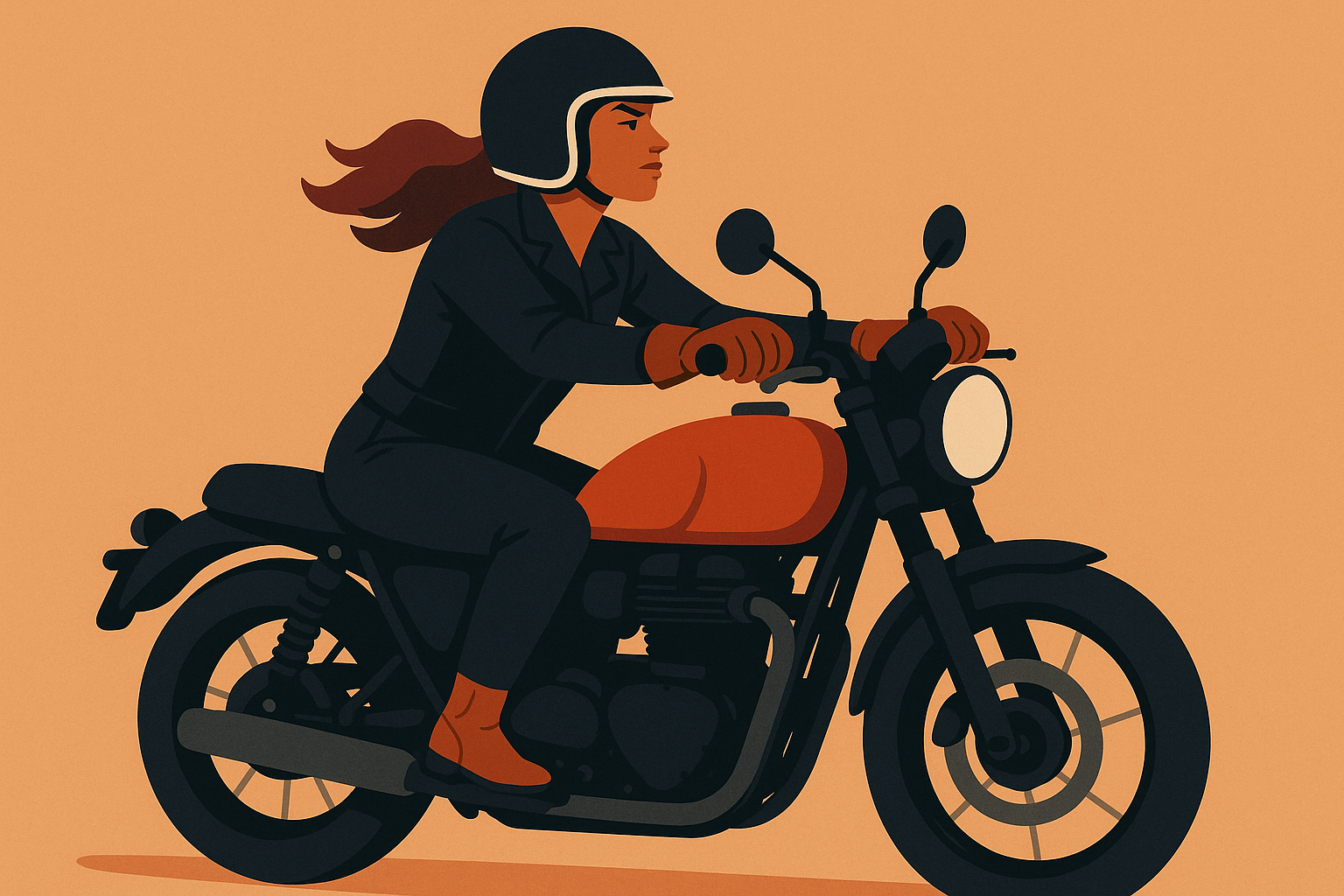
Here's what I wish someone had told me when I started riding: your gloves are just as important as your helmet, and they should fit just as well. Don't settle for "good enough" because you think that's all that's available for women.
The gear is finally catching up to what we actually need. We don't have to choose between protection and comfort anymore. We don't have to put up with gloves that don't fit right or features we don't need.
Your hands are your primary connection to your bike, and they deserve gear that's engineered for how you actually ride, rather than how manufacturers think you should ride. Whether it's accommodating your natural grip patterns, integrating the technology you actually use, or providing materials that work with your body's temperature fluctuations, the right gloves make every ride safer and more enjoyable.
The future of women's motorcycle gear looks promising, with manufacturers finally investing in real research and development rather than just shrinking men's designs. As more women demand better, the industry responds with innovations that benefit everyone.
Your choice to invest in properly designed gear doesn't just protect you - it supports continued innovation for the next generation of female riders, much like how proper maintenance practices ensure long-term safety and performance.
Now get out there and ride. Just do it with gloves that actually fit.









